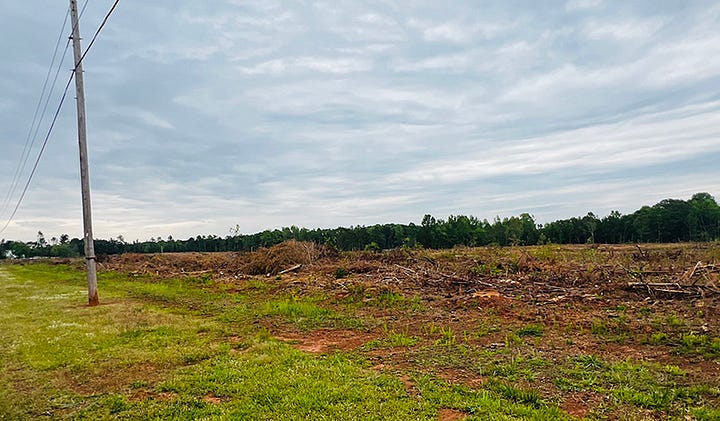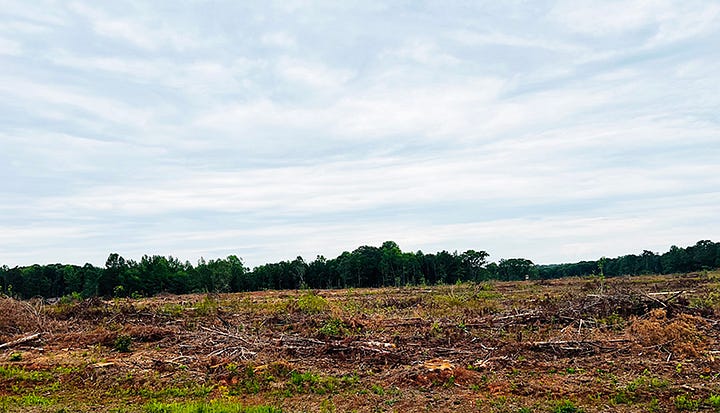Who doesn’t love Spring? But there are melancholy moments, too, because all the while I’ve had my eyes on the slow succession of early flowering trees, others have been making quite different calculations. The warming days and nights that provide so much pleasure and promise for the winter-weary are also the first opportunity, as the sap rises in the big pines, for the logging trucks to roll.
I’m not sure how to describe the sensation. When you live in the country, things don’t change much, so you get wedded to certain sights along your various routes into the big wide world. Or at least I do. Like… that flowering apricot tree across from the Baptist church that is the first to flower every spring. I even get attached to certain stretches of woods—the way the road curves or crosses a stream and mounts a hill as you’re taking the back route to the interstate or even just driving to the dump.
There I am, noodling along, mind on nothing much at all, and suddenly those trees I’ve taken for granted would be there forever — providing views and shade and shelter to small things, not to mention all those essential ecosystem services — are gone. Wiped from the map.
They haven’t disappeared entirely, of course. They’ve been chopped down and hauled off to be converted into coin. These are important dollars in a poor state— last time I checked, the forestry sector is responsible for nearly half the state’s agribusiness profits. But looking at the piles of drying brush, the bleeding gashes in the clay soils left behind by the heavy machinery, I’m left wondering—do we know what the land is for?
OK, full stop. Weyerhaeuser and Georgia-Pacific have an answer to that question. But it’s not the only one. It’s certainly not the one that’s going to save us.
Wendell Berry, the patron saint of the small family farm, wrote in the book that launched him into environmental advocacy that there’s a “hidden wound” at the heart of the American relationship to the land. And that wound is plantation slavery. You read that right. Indeed, he went much further than that.
Slavery, Berry argued in The Hidden Wound, is at the root of all sorts of modern ills. It poisoned all American relationships to work by allowing whites to bestride the earth like conquerors while denying to those who do the hard, dirty, thankless jobs—whether black or female or brown or poor white—any of the perquisites of ownership. Moreover, in degrading the workers, slavery also cheapened the status of what was being worked — our Mother Earth — by incentivizing extraction in the name of commerce by any and all means, regardless of destructiveness or brutality.
The legacy of this “hidden wound” is a general scorn for hard work unless it somehow also conveys the privileges of “mastery.” (Try convincing a suburbanite that migrant workers perform skilled labor. I’ll wait.) Similarly, there’s a lingering attitude of manifest destiny in our relationships with the land. Even though it’s no longer limitless in its extent and its fertility as in those long-ago days of invasion and conquest, it’s still treated as something, in Berry’s unforgettable phrase, to work like a wagon until it breaks.
Written in the wake of the King assassination and Berry’s own abandonment of academia to return to the land, the book connects the dots between the isms—racism, sexism, classism—and our national state of alienation: alienation from each other, alienation from meaningful work. For Berry, it’s all rooted it all in our alienation from land.
What’s your relationship to land? I guess I’m thinking we should all be thinking about Aldo Leopold’s call in “The Land Ethic” for humans to regard our obligations to tend and restore the earth as seriously as we regard our right to profit from it.
Leopold was a forester, the first in the history of the profession to receive a graduate degree in the field, and his clarion call was, in fact, published posthumously. I often think of him when I ponder our local forests, so many of them not forests at all, but rather “managed forest plantations” that will be clear-cut the moment the trees reach the desired dimension at breast height. This is a literal measurement, by the way, abbreviated in the trade as “DBH.”
Sigh. Anyway, driving to the butcher today, I passed this sight.


So today I’m a melancholy baby. But unlike the song, my fears for the planet are absolutely not foolish fancy.
_____
For further reading on Berry, you might start with Joshua P. Hochschild, “Race and Anti-Fragility,” in the Aug. 5, 2020, issue of Commonweal. But it would be better to just hop on over to Amazon and buy the book.



